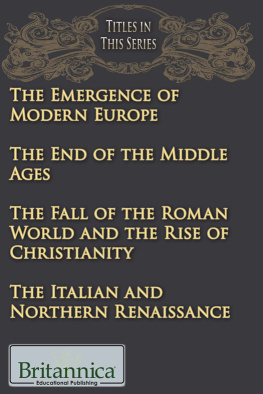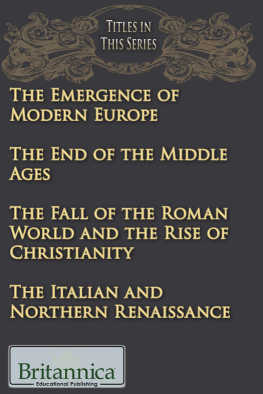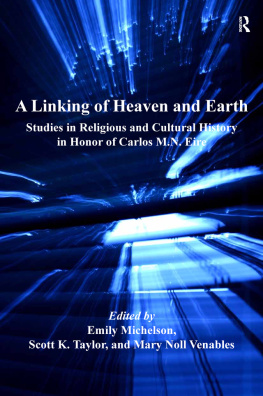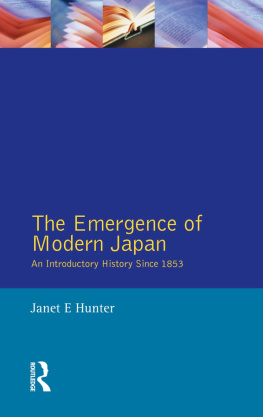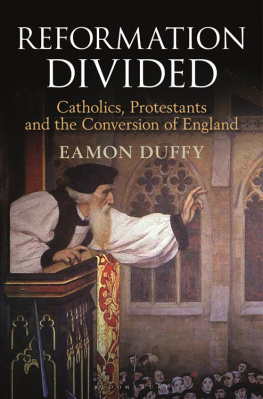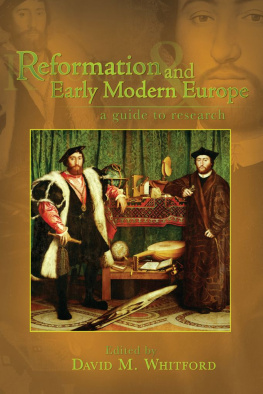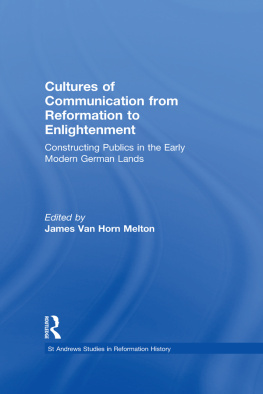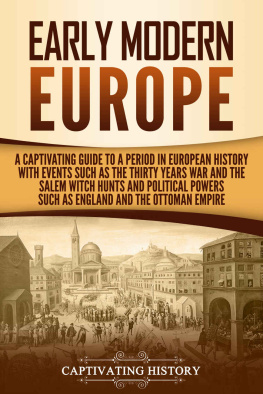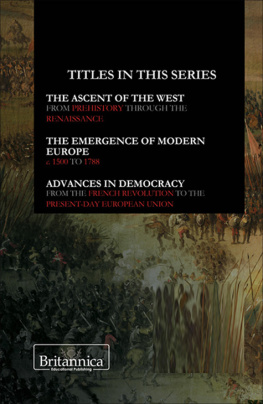

Published in 2018 by Britannica Educational Publishing (a trademark of Encyclopdia Britannica, Inc.) in association with The Rosen Publishing Group, Inc.
29 East 21st Street, New York, NY 10010
Copyright 2018 by Encyclopdia Britannica, Inc. Britannica, Encyclopdia Britannica, and the Thistle logo are registered trademarks of Encyclopdia Britannica, Inc. All rights reserved.
Rosen Publishing materials copyright 2018 The Rosen Publishing Group, Inc. All rights reserved.
Distributed exclusively by Rosen Publishing.
To see additional Britannica Educational Publishing titles, go to rosenpublishing.com.
First Edition
Britannica Educational Publishing
J.E. Luebering: Executive Director, Core Editorial
Andrea R. Field: Managing Editor, Comptons by Britannica
Rosen Publishing
Meredith Day: Editor
Nelson S: Art Director
Brian Garvey: Designer
Cindy Reiman: Photography Manager
Bruce Donnola: Photo Researcher
Library of Congress Cataloging-in-Publication Data
Names: Roscoe, Kelly, editor.
Title: The emergence of modern Europe / edited by Kelly Roscoe.
Description: First edition. | New York : Britannica Educational Publishing, in association with Rosen Educational Services, 2018. | Series: Power and religion in medieval and renaissance times | Includes bibliographical references and index.
Identifiers: LCCN 2016053737 | ISBN 9781680486223 (eBook)
Subjects: LCSH: Europe--History--17th century. | History, Modern--17th century. | Thirty Years War, 1618-1648.
Classification: LCC D246 .E47 2018 | DDC 940.2/2--dc23
LC record available at https://lccn.loc.gov/2016053737
Manufactured in the United States of America
Photo credits: Cover, pp. 3, 13, 43, 56, 72, 88, 105 Conde/Shutterstock.com; pp. 8-9, 106, 110 Photos.com/Thinkstock; pp. 16-17 DEA/A. Dagli Orti/De Agostini/Getty Images; pp. 20-21, 22, 76-77 Print Collector/Hulton Archive/Getty Images; pp. 26-27 Print Collector/Hulton Fine Art Collection/Getty Images; p. 31 Universal History Archive/Universal Images Group/Getty Images; pp. 34-35, 52 De Agostini Picture Library/Getty Images; pp. 40-41 Universal Images Group/Getty Images; pp. 45, 64-65, 112, 114 Encyclopdia Britannica, Inc.; p. 47 Alamy Stock Photo; p. 49 Everett - Art/Shutterstoc.com; p. 58 Georgios Kollidas/Shutterstock.com; pp. 60, 74-75 ullstein bild/Getty Images; pp. 66-67 Apic/Hulton Archive/Getty Images; p. 69 Interfoto/Alamy Stock Photo; p. 80 Courtesy of the Kunsthistorisches Museum, Vienna; pp. 84-85 Christophe Boisvieux/Corbis Historical/Getty Images; pp. 90-91 Imagno/Hulton Fine Art Collection/Getty Images; p. 93 Courtesy of the Bayerische Staatsgemaldesammlungen, Munich; p. 94 Private Collection/Bridgeman Images; pp. 96-97 ZU_09/Getty Images; pp.102-103 Deutsches Historisches Museum, Berlin, Germany/ DHM/Bridgeman Images; interior pages background and border graphics Roberto Castillo/Shutterstock.com; back cover flourish Drakonova/Shutterstock.com
Contents
I n the 15th century, observers such as the philosopher and clerical statesman Nicholas of Cusa suggested that the Middle Age had attained its conclusion and a new era had begun. The Papacy, the symbol of the spiritual unity of Christendom, had lost much of its prestige in the Great Western Schism, a period from 1378 to 1417 in which there were two, and later three, rival popes. Lay ideals in the Italian peninsula also began to affect the Papacy. In the 16th century, the Protestant Reformation reacted against the worldliness and corruption of the Holy See, and the Roman Catholic church responded in its turn by a revival of piety known as the Counter-Reformation. While the forces that were to erupt in the Protestant movement were gathering strength, the narrow horizons of the Old World were widened by the expansion of Europe to America and the East.
The 16th century in Europe was a period of vigorous economic expansion. This expansion in turn played a major role in the many other transformationssocial, political, and culturalof the early modern age. By 1500 the population in most areas of Europe was increasing after two centuries of decline or stagnation. The bonds of commerce within Europe tightened. The great geographic discoveries then in process were integrating Europe into a world economic system. New commodities, many of them imported from recently discovered lands, enriched material life. Both trade and the production of goods increased as a result of new ways of organizing production. Merchants, entrepreneurs, and bankers accumulated and manipulated capital in unprecedented volume. Most historians locate in the 16th century the beginning, or at least the maturing, of Western capitalism. Capital assumed a major role not only in economic organization but also in political life and international relations. Culturally, new valuesmany of them associated with the Renaissance and Reformationdiffused through Europe and changed the ways in which people acted and the perspectives by which they viewed themselves and the world.
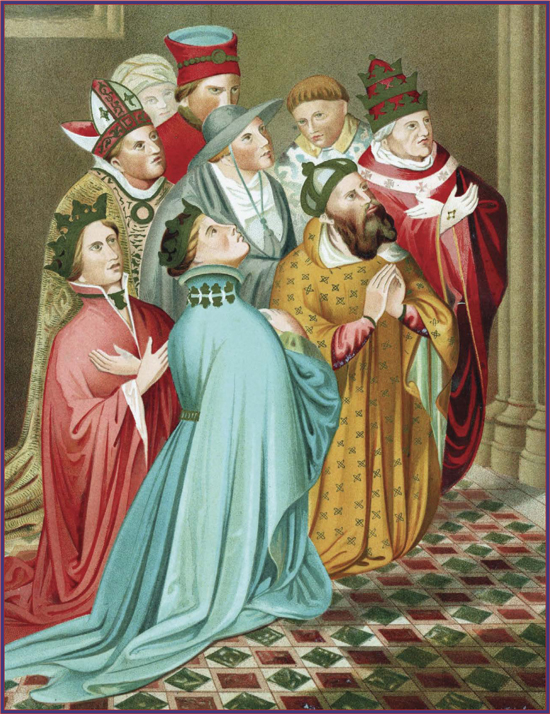
The Council of Constance took action to end the Great Western Schism, an event that contributed to the papacy losing some influence in the late Middle Ages.
This world of early capitalism, however, can hardly be regarded as stable or uniformly prosperous. Financial crashes were common; the Spanish crown, the heaviest borrower in Europe, suffered repeated bankruptcies (in 1557, 157577, 1596, 1607, 1627, and 1647). The poor and destitute in society became, if not more numerous, at least more visible. Even as capitalism advanced in the West, the once-free peasants of central and eastern Europe slipped into serfdom. The apparent prosperity of the 16th century gave way in the middle and late periods of the 17th century to a general crisis in many European regions. Politically, the new centralized states insisted on new levels of cultural conformity on the part of their subjects. Several states expelled Jews, and almost all of them refused to tolerate religious dissenters. Culturally, in spite of the revival of ancient learning and the reform of the churches, a hysterical fear of witches grasped large segments of the population, including the learned. Understandably, historians have had difficulty defining the exact place of this complex century in the course of European development.
In western Europe, nation-states emerged under strong monarchical governments, breaking down local immunities and destroying the unity of the European respublica Christiana (Christian republic). Centralized bureaucracy came to replace medieval government. Underlying economic changes affected social stability. Secular values prevailed in politics, and the concept of a balance of power came to dominate international relations. Diplomacy and warfare were conducted by new methods. Sovereigns established permanent embassies in other states, and on the battlefield standing armies of professional and mercenary soldiers took the place of the feudal array that had reflected the social structure of the past. At the same time, scientific discoveries cast doubt on the traditional cosmology. The systems of Aristotle and Ptolemy, which had long been sanctified by clerical approval, were undermined by Copernicus, Mercator, Galileo, and Kepler.

